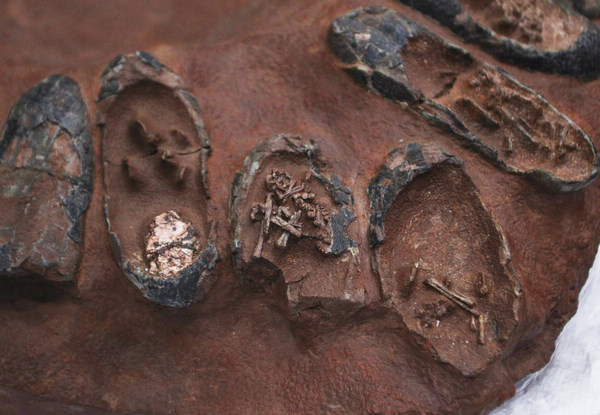Museum welcomes back a dear old 'guest'
Updated: 2012-02-29 08:02
By Cheng Yingqi (China Daily)
|
||||||||
BEIJING - It was normally the busiest time of the day in Wang Lixia's office on the sixth floor of the Geological Museum of China.
But at 10:30 am on Tuesday, everyone stopped talking. A VIP guest was due to arrive.
|
 |
|
A nest of fossilized dinosaur eggs is displayed in Beijing on Tuesday. The nest, estimated to be at least 65 million years old, was returned to China after being smuggled to the United States. [Photo by Zou Hong / China Daily] |
Finally, Wang broke the silence. "Hey, they just called and they're only a few blocks away. Why don't we wait downstairs?"
Everyone swarmed down to be the first ones to see the famous visitor they had been waiting for. Actually, they had been waiting five years for this moment.
For the VIP was not a top official or superstar, but a very important prehistoric guest - a nest of fossilized dinosaur eggs believed to be 65 million years old.
The egg fossils were unearthed in Guangdong province in 1984 but smuggled out of China. In 2003, a collector in the United States purchased the nest from a source in Taiwan.
But it wasn't until 2006, that dinosaur experts in China became aware of the eggs when they were auctioned in Los Angeles for $419,750.
The experts appealed to the Chinese government and the Ministry of Foreign Affairs began efforts to bring the dinosaur nest home.
China's claims persuaded the US Federal Bureau of Investigation and Los Angeles police to investigate the smuggling case, and within two months the fossilized eggs had been confiscated.
But the buyer of the nest contested ownership and it was only recently that judicial authorities ruled that the fossils belonged to China.
Tao Qingfa, an official from the Ministry of Land and Resources who took part in the nest's repatriation, said that the case set an example for China and US cooperation on law enforcement, and will be a basis for further action against fossil smugglers.
Between 2008 and 2010, Chinese customs uncovered six smuggling cases in Shenzhen, Shanghai, Tianjin and Beijing, involving more than 60 fossils, according to the Ministry of Land and Resources.
Wang said China had an abundance of fossils and was gradually strengthening protection measures.
"Last year, we set up a committee, including experts from the ministry, the Chinese Academy of Sciences, and from customs to investigate better ways of protecting fossils," she added.
"But first we have to carry out national surveys on the extent of fossil resources in China."
At the Geological Museum of China, where the fossilized eggs will initially be stored in the basement for analysis, staff watched the precious cargo being unloaded.
The silence of earlier returned as four people gently laid the box down, removed nails and lifted the nest out.
It was worth waiting for.

 Relief reaches isolated village
Relief reaches isolated village
 Rainfall poses new threats to quake-hit region
Rainfall poses new threats to quake-hit region
 Funerals begin for Boston bombing victims
Funerals begin for Boston bombing victims
 Quake takeaway from China's Air Force
Quake takeaway from China's Air Force
 Obama celebrates young inventors at science fair
Obama celebrates young inventors at science fair
 Earth Day marked around the world
Earth Day marked around the world
 Volunteer team helping students find sense of normalcy
Volunteer team helping students find sense of normalcy
 Ethnic groups quick to join rescue efforts
Ethnic groups quick to join rescue efforts
Most Viewed
Editor's Picks

|

|

|

|

|

|
Today's Top News
Health new priority for quake zone
Xi meets US top military officer
Japan's boats driven out of Diaoyu
China mulls online shopping legislation
Bird flu death toll rises to 22
Putin appoints new ambassador to China
Japanese ships blocked from Diaoyu Islands
Inspired by Guan, more Chinese pick up golf
US Weekly

|

|







